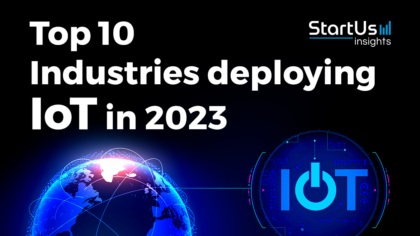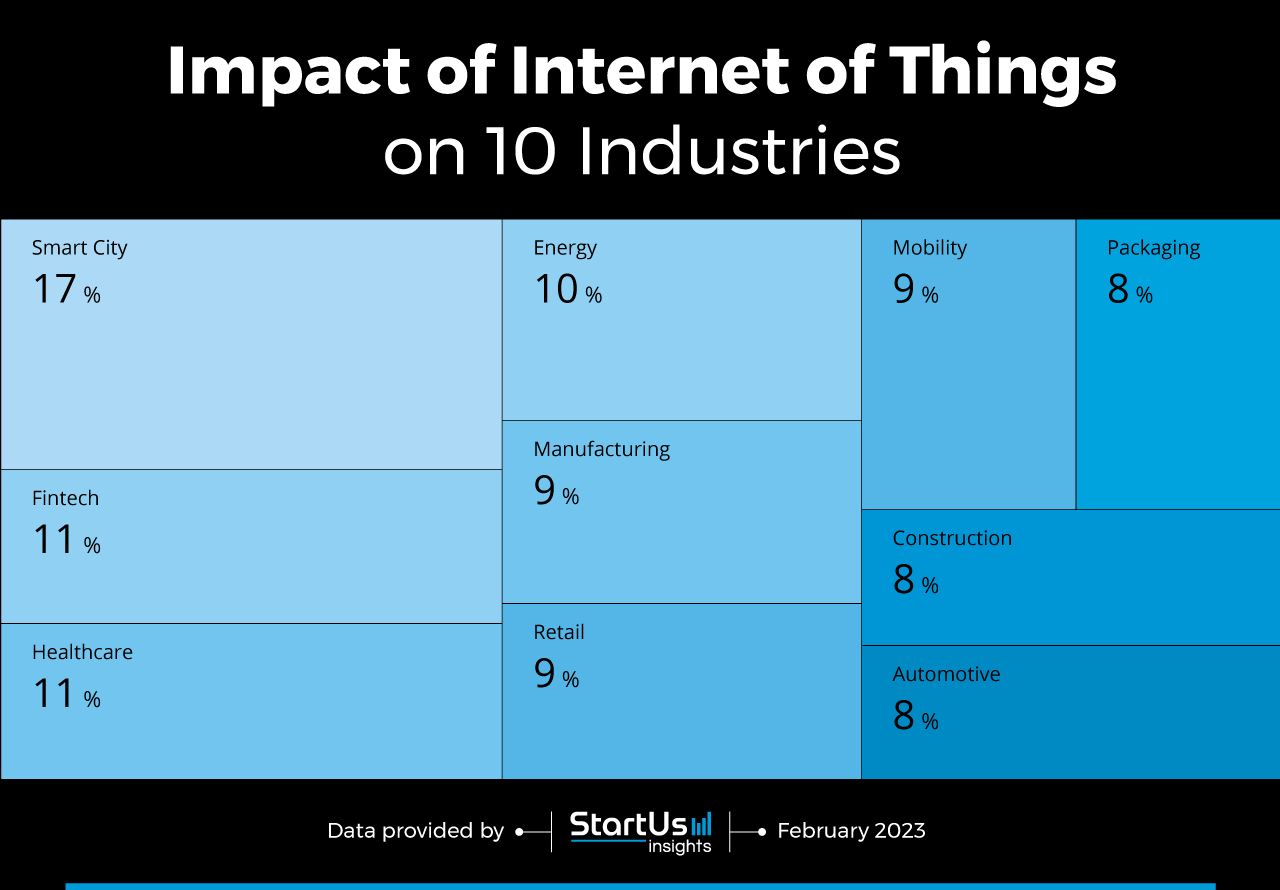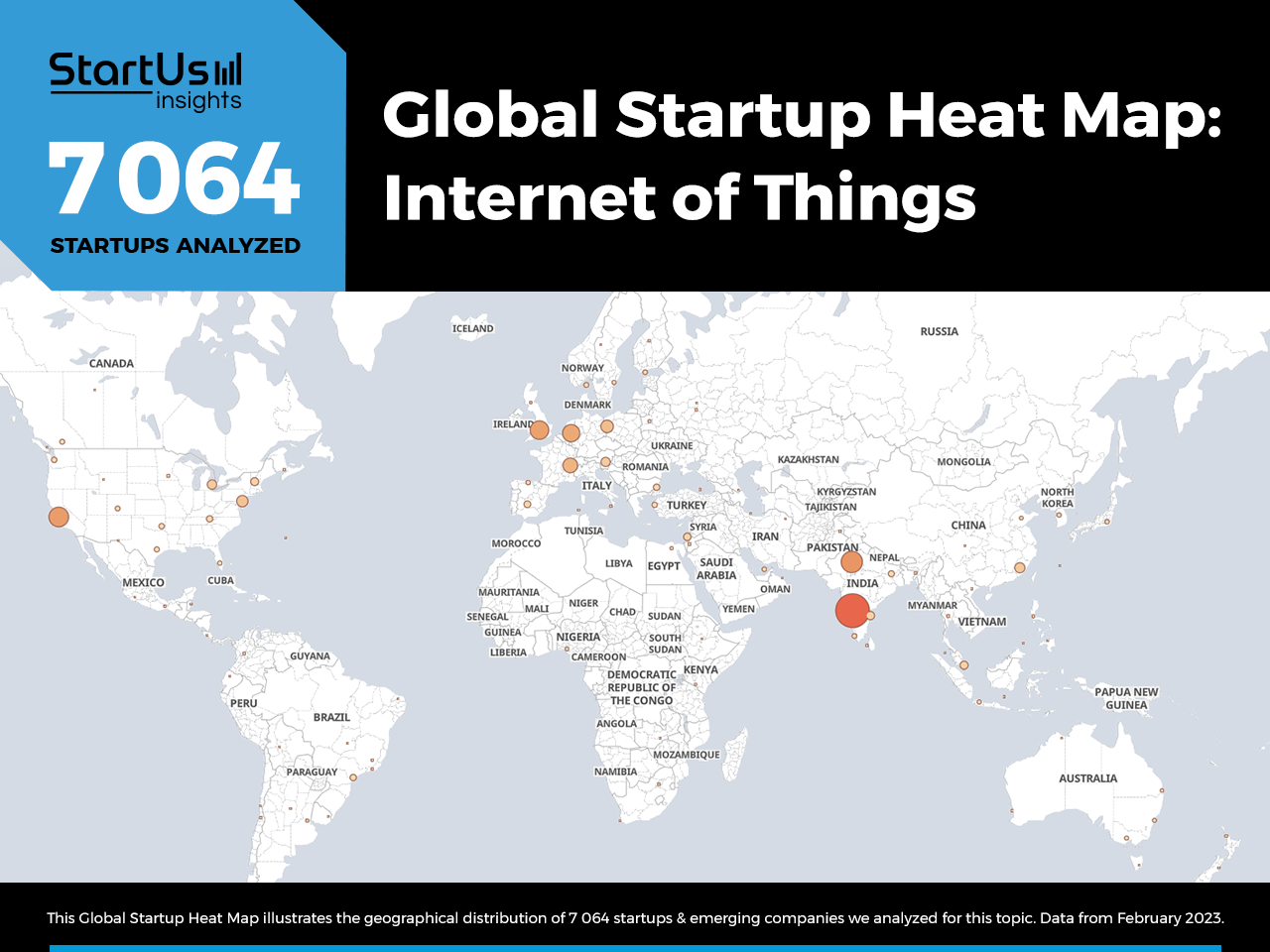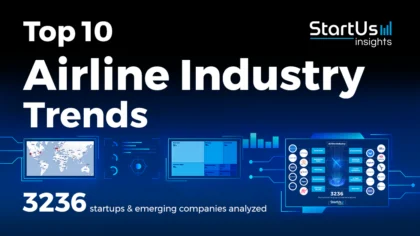Industries need real-time asset information to make the most of data processing solutions like big data, artificial intelligence (AI), and machine learning. The internet of things (IoT) combines sensors and connectivity technologies to collect a range of information from temperature and pressure to material quality and pollution. We give you data-driven insights into the top applications of IoT based on our analysis of 7064 startups & technologies so that you do not miss out on emerging solutions that simplify data acquisition. These solutions allow you to improve throughput and enhance asset visibility. Read more to explore the top IoT use cases and how they advance your business.
Tree Map reveals the Top Applications of IoT across 10 Industries
Based on the Innovation Map, the Tree Map below illustrates the emerging IoT applications across 10 industries in 2023. The smart city industry sees the most activity among Internet of Things startups to improve traffic management, city planning, and more. At the same time, the energy, manufacturing, mobility, packaging, construction, and automotive industries leverage IoT to enable asset and worker monitoring.
Additionally, it allows businesses to collect real-time operational data to improve performance. Lastly, FinTech and retail companies use IoT to improve security and personalize product offerings while the healthcare sector leverages it for patient monitoring.
Global Startup Heat Map covers 7064 Startups & Scaleups
The Global Startup Heat Map below highlights the global distribution of the 7064 exemplary startups & scaleups that we analyzed for this research. Created through the StartUs Insights Discovery Platform that covers 3 790 000+ startups & scaleups globally, the Heat Map reveals that India has a high concentration of Internet of Things startups, followed by Western Europe.
Below, you get to meet 10 out of these 7064 promising startups & scaleups as well as the solutions they develop. These 10 Internet of Things startups are hand-picked based on criteria such as founding year, location, funding raised, and more. Depending on your specific needs, your top picks might look entirely different.
Interested to explore all 7000+ Internet of Things startups?
Top Examples of IoT in 2023 & 2024
1. Smart Cities
Cities leverage sensors and other connected devices, including vehicles, to improve operations. The data from the connected devices aid infrastructure planning, traffic management, and improving life quality. For city administration, IoT enhances visibility into operations, as well as curb pollution, and improve safety.
To aid this, Internet of Things startups are developing solutions that enable vehicle-to-everything (V2X) connectivity, smart utility management, asset monitoring, and more. For instance, intelligent grids gather real-time demand and supply data while V2X connectivity improves visibility into vehicle battery conditions. Using this data, electric grids are able to reduce blackouts and enhance demand-side management.
Intelense facilitates Anomaly Detection
Canadian startup Intelense aids traffic, airport, and emergency care management. The startup’s platform, KEN AI, combines IoT, AI, data analytics, 5G, and an application programming interface (API) to identify behavioral anomalies. This includes the detection of shoplifting, trespassing, and other security threats in real time, allowing authorities to improve city safety.
2. Financial Technology
Smart bank branches, mobile banking, and automated teller machines (ATMs) are the most used IoT solutions in FinTech. Advances in the field enable easier adoption of connected devices among customers to improve visibility into transactions and enable hyper-personalized services. IoT-enabled and peer-to-peer (P2P) cash transfers aid cashless transactions, while biometrics enhance the security of financial applications and interactions.
Further, connected financial applications and open banking make it easy for service providers to easily collect customer information. This data enables banks and non-banking financial companies (NBFCs) to prevent fraud and mitigate risks.
LGR Global aids Supply Chain Financing
LGR Global is an Estonian startup that facilitates supply chain financing. The startup’s solution leverages IoT, data analytics, AI, and smart contracts to create digital twins of real-time supply chain conditions.
This improves the transparency of supply chain operations and allows trading partners to upload digital documents. The platform then validates its content using smart contracts to identify discrepancies in trade finance processes. Besides, LSR Global’s solution enables instantaneous cross-border money movement and manages customer compliance risks.
3. Healthcare
The healthcare industry uses massive amounts of medical devices to diagnose and treat patients. IoT in hospitals enables physicians to leverage the data generated by these devices to improve healthcare delivery and provide personalized care. For example, IoT-enabled pacemakers allow hospitals and medical device manufacturers to continuously monitor heart functioning and promptly identify heart rate variations.
Further, IoT-powered hospital environments improve visibility into operations such as patient management, inventory monitoring, and medical waste management. Such healthcare IoT solutions reduce operational costs for hospitals and improve patient care.
SiriuXense enables At-Home Fetal Care
SiriuXense is a Taiwan-based startup that provides an at-home fetal care system. It is a wearable solution that uses AI, IoT, sensor fusion, and edge computing for phonocardiogram and fetal movement statistics. The wearable provides fetal and maternal biometrics and thus enables health monitoring of fetuses, elders, and patients.
4. Energy
Adding IoT to energy infrastructures enables smart grids through continuous power consumption and asset monitoring. This allows energy distributors to improve grid management and ensure the integrity of the infrastructure by enhancing maintenance planning. For this, startups offer IoT-integrated solutions tailored for energy companies and smart meters for households.
Since these connected devices retrieve real-time information, energy companies apply advanced analytics to this data to derive hidden consumption patterns and trends. Consequently, it further allows them to improve demand-side management and sustainability while reducing blackouts.
aliunid offers Real-Time Energy Data
aliunid is a Swiss startup that offers projects for energy and network companies to address the challenges of decentralization, decarbonization, and digitization. Real-time data is collected on energy production, distribution networks, customers, and electric vehicles.
This data enables analyses of load profiles, EV charging behavior, and scenarios for distributed energy resources. Grid operators identify overloaded transformer stations and optimize charging in real time to reduce peaks and use local solar power.
5. Manufacturing
IoT devices integrate into production floors to improve visibility into all manufacturing operations, from inventory tracking and movement to worker and asset monitoring. Moreover, most assets in manufacturing plants are immobile, and those that are mobile do not operate beyond the factory premises.
Therefore, Internet of Things startups develop solutions tailored for manufacturing applications that enable granular visibility into all assets. Besides, the real-time data collected from IoT devices power digital twins, predictive maintenance, and more in the manufacturing sector. Consequently, IoT improves decision-making and production throughput while reducing operational costs.
SixSense simplifies Defect Detection
SixSense is a Singaporean startup building an AI-powered defect analytics platform for smart manufacturing. The startup’s automated defect classification solution, classifAI, leverages computer vision. Its analytics software, causifAI, scans factory data to identify asset and process issues caused by the defects.
Lastly, SixSense’s defect prediction tool, predictAI, monitors equipment in real-time and predicts anomalies. These products allow manufacturers to mitigate high-cost visual quality inspection and automate defect detection and prediction.

6. Retail
The internet of things enables connected stores that improve customer experience and increase revenue. Cashless interactions and self-checkout stores leverage IoT devices to automate financial transactions and exchanges. Further, IoT improves transparency in retail store activities like customer footfall and employee monitoring.
Such solutions enable retail companies to personalize product offerings and reduce inefficiencies. In retail warehouses, IoT-based solutions enable better space utilization and inventory tracking. This, in turn, improves supply chain management and order visibility.
Neoalto offers Smart Shelf Sensors
German startup Neoalto develops smart shelf sensors. They track products being lifted from the shelves to update the inventory management system and identify shoplifting situations.
The startup also offers sales analytics and automated inventory purchasing tools. Neoalto thus enables retailers to automate inventory management and ensure product availability to improve reliability and sales.
7. Mobility
CCTV feeds, parking sensors, traffic data, and accident assistance systems allow mobility providers to improve fleet management, safety, and efficiency. At the same time, IoT devices simplify vehicle tracking and enhance visibility into all assets.
With this, mobility companies are able to ensure optimal fleet utilization and improve customer experience. Further, the data collected through IoT solutions allow them to personalize service offerings and enhance customer satisfaction. IoT in mobility also advances shared mobility by enabling commuters to easily track and locate vehicles.
Digital Infrastructure for Moving Objects (DIMO) builds a Vehicle IoT Platform
US-based startup DIMO builds a user-owned connectivity IoT platform. It allows drivers or fleet managers to utilize the startup’s companion apps and get insights about their vehicles. Drivers also contribute data to the open ecosystem to facilitate the development of new technologies and applications.
At the same time, DIMO provides the required tools for mobility solution developers to build apps and tools that advance EV batteries, shared mobility services, insurance management, and zero-emission mobility.
8. Packaging
Connecting conventional controllers and machines to networks centralizes asset management and control for the packaging sector. This improves the overall packing efficiency and simplifies the automation of legacy systems. For package manufacturers, IoT integration enhances visibility into production operations and inventory.
Consequently, they are able to optimize material movement, raw materials sourcing, and more. Moreover, IoT-powered packages enable a connected packaging ecosystem that allows customers to interact with brands and aids recycling efforts.
Senoptica Technologies creates Active Packaging
Irish startup Senoptica Technologies provides a sensor-based active product packaging solution. The startup prints its sensor directly onto the modified atmosphere packaging (MAP) lidding film. It detects the oxygen level in the pack and modifies the color during scanning. This allows managers to identify defective MAP components and strengthen quality control.
9. Construction
The construction sector relies on expensive and heavy machines for its operations. IoT enables project managers to continuously track these assets and ensure maximum utilization. Besides, it improves safety by monitoring hazardous areas to remove workers.
Construction companies also utilize IoT to gather real-time information about project progress and simplify reporting. This improves the transparency between building owners and developers. Lastly, construction firms leverage IoT to monitor building performance, detect damages, and enable construction analytics.
Lattice Build Technology provides an AI-based Site Manager
Indian startup Lattice Build Technology develops an AI-powered construction site manager. The startup’s IoT system collects data through a wireless network and a convoy of low-power sensors. This permits real-time location tracking of people, tools, and materials in dynamic work environments.
The startup’s platform then turns real-time field awareness into site intelligence, saving time and cost. As a single point of truth, it provides greater transparency and visibility into asset allocation, enabling data-driven decisions and mitigating physical inspections.
10. Automotive
Automotive manufacturers primarily use IoT to enable continuous production asset and worker monitoring. Such IoT solutions allow them to find inefficiencies and improve worker safety. However, advances in IoT allow its integration into vehicles to enable connected cars, trucks, and more. They collect real-time vehicle and surrounding data to improve situational awareness.
This furthers the performance of autonomous driving, vehicle-to-vehicle (V2V), and V2I systems, among others. Vehicle IoT devices also monitor vehicle conditions like engine temperature and fuel intake to optimize performance and predict faults, improving safety.
Espio makes a Nanosized Temperature Sensor
Espio is a Slovak startup that manufactures a nanosized temperature sensor. It combines a flexible and adhesive or non-adhesive foil, a graphene layer, and a passivation layer.
Therefore, the sensor is installable on flat or curved surfaces and collects data from smaller or larger areas. It thus finds applications in electric vehicle (EV) batteries and automotive electronics to monitor their temperature.
Discover All Internet of Things Startups
Other industries leveraging IoT include food, sports, agriculture, maritime, logistics, and more. Advances in 5G, edge IoT, and high-performance computing (HPC) will enhance the overall performance of IoT devices and expand their use cases across industries. Moreover, startups are focusing on reducing IoT integration expenses through cost-effective devices and IoT-as-a-service models. This will further increase IoT deployment. Get in touch to identify specific internet of things startups & solutions that advance your business!










